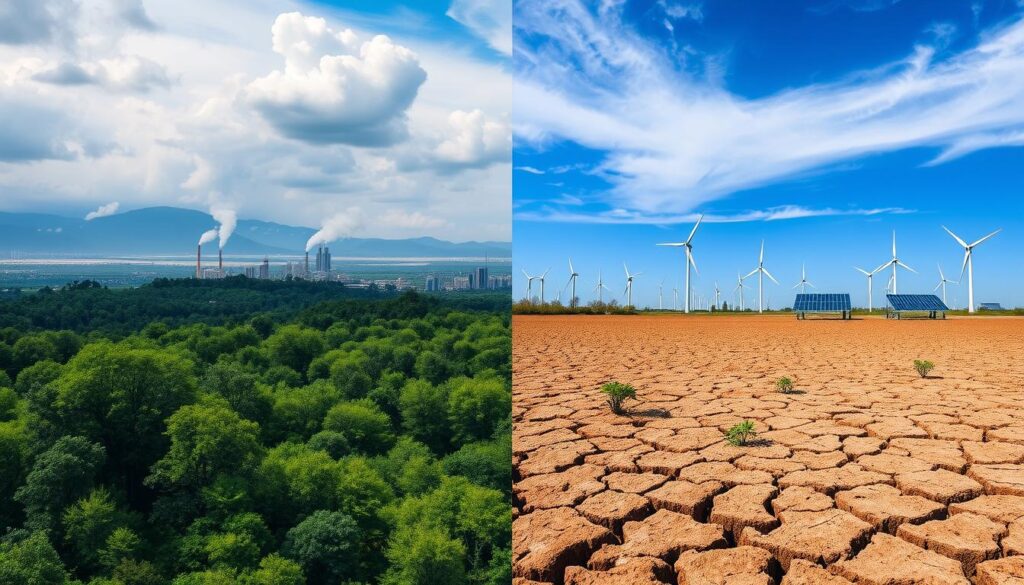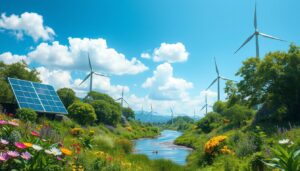שינויי אקלים הם אתגר גדול שאנו עומדים בפניו ברמה גלובלית. זה משפיע על בריאות הכדור הארץ. העלייה בחממת גלובוס מראה שאנו צריכים לפעול מהר. כולם צריכים לשחק תפקיד בהלחם במשבר זה. הפאנל הבינלאומי למעקב אחר שינויי האקלים (IPCC) שיתף פעולה כמה מגמות מדאיגות. אנו צריכים להתחיל לחיות בצורה יותר קיימת ולקחת צעדים אישיים כדי לעזור. מאמר זה ידון במהו שינויי האקלים, ההשפעות שלהם, ודרכים להתמודד איתם.
מסקנות מרכזיות
- שינויי אקלים הם נושא עיקרי שמשפיע על כל תחום בחיים.
- מה שאנו עושים כאיש פרטי חיוני להלחם בחממת גלובוס.
- ידע נוסף והוראה לאחרים עשויים לעזור לנו לחיות בצורה יותר קיימת.
- העבודה המשותפת בקהילות שלנו עשויה להביא פתרונות לבעיות אלה.
- תמיכה ממדיניות ממשלתית חשובה להצלחת מאמצינו.
מהו שינויי אקלים?
הבנת הגדרת שינויי האקלים
היא מרכזית בעולם היום. זה לא על שינויים חומרתיים קצרים. זה על שינויים ארוכי טווח בטמפרטורה ובתבניות מזג אוויר. השינויים הללו, הנקראים שינויי טמפרטורה גלובליים, לוקחים עשורים כדי לקרות. הארגון המטאורולוגי העולמי אומר שזהו שינוי גדול במזג האוויר לאורך תקופות ארוכות. זה בעיקר נגרם על ידי פעולות אנושיות ותהליכים טבעיים.
הגדרה וסקירה
שינויי אקלים מגיעים ממקורות שונים. פעולות אנושיות כמו שריפת דלק גופרית וכריתת יערות מוסיפות המון ל- גזי חממה. גזים אלה מחזקים את אפקט החממה. זה מחמם את כדור הארץ שלנו ומבלבל את המזג האוויר. נאס"א וקבוצות אחרות אומרות שעלינו לפעול מהר.
גורמי שינויי אקלים
הגורמים העיקריים לשינויי אקלים מגיעים מהאדם. שריפת פחם, נפט וגז שולחת המון פחמן דו חמצני וגזים אחרים לאוויר. גזים אלה תופסים חום על כדור הארץ. הנה כמה גורמים עיקריים:
- תעשיות ששוחררות פולוטנטים.
- רכבים נוספים משמעותם יותר זיהום אוויר.
- חקלאות משדרת מתן וחמצן חנק.
אף על פי שאנשים גורמים לרוב לשינויי אקלים, הטבע גם משחק תפקיד. דברים כמו געגועים ושינויים בשמש משפיעים גם על טמפרטורתנו. סוכנות ההגנה הסביבתית של ארצות הברית (EPA) מציגה כיצד החלקים הללו מתאימים יחדיו ומחמירים את שינויי האקלים.
| גורם | השפעה |
|---|---|
| פליטות פחמן דו חמצני (CO2) | העלאת טמפרטורות גלובליות ושינוי בתבניות המשקיפים |
| פליטות מתאן | פוטנציאל חימום חשוב, המוביל לשינוי אקלים מאוחר |
| כירות יער | אובדן מקורות הפחמן, עליית ריכוז פחמן דו חמצני באטמוספירה |
| התפרצויות געשים | אפקטים קירור קצרי טווח דרך השפעת אפר ופליטת גזים |
| שינויים בקרינת השמש | השפעה על אקלים הכדור הארץ לאורך זמנים גיאולוגיים |
השפעת שינויי האקלים על הסביבה
שינויי אקלים משפיעים עלינו בכמה דרכים. הם משנים את האקוסיסטמות שלנו, את המזג האוויר ואת הבריאות. הבנת עליית טמפרטורות גלובליות, תופעות מזג אוויר קיציות, ואובדן הביודיברסיטה היא מרכזית.
עליית טמפרטורות גלובליות
במאה האחרונה, האדמה התחממה באופן משמעותי. התחממות זו נגרמת על ידי יותר גזי חממה באוויר. היא משנה את המזג האוויר והאקוסיסטמות שלנו.
נתוני NOAA מראים כי ב-50 השנים האחרונות היו חמים באופן יוצא דופן. זה מעיד על כך ששינויי אקלים הם בעיה רצינית.
תופעות מזג אוויר קיציות
שינויי אקלים הפכו את תופעות המזג אוויר הקיציות לנפוצות וחמורות יותר. הורקנים, שיטפונות ויבשות הם כעת יותר אינטנסיביים. זה מביא ליותר אסונות טבע ברחבי העולם.
מחקרים ממרכז הורקנים הלאומי מראים כי השינויים הללו משפיעים על קהילות ואקוסיסטמות. קיים קשר ברור בין שינויי אקלים והמזג האוויר שלנו.
השפעות על הביודיברסיטה
שינויי אקלים וביודיברסיטה מחוברים בצורה צמודה. טמפרטורות חמים יותר ואובדן מרחבי מחיה מאיימים על מין רבים. ההזזות באקלים עושות קשה למינים לשרוד.
דיווחים מה-WWF וה-IUCN מראים שמין רבים נמצאים בסכנה. עלינו לפעול כעת כדי להציל מרחבי מחיה ומינים. חיוני לעצור את ההשמדת המרחבים.
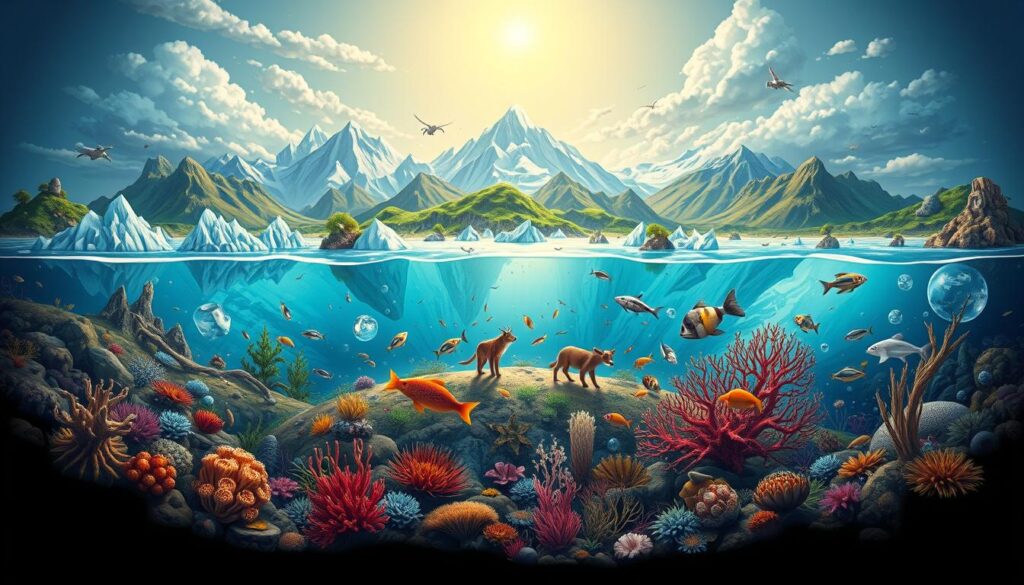
| אזור השפעה | פרטים |
|---|---|
| עליית טמפרטורה גלובלית | עליית טמפרטורה ממוצעת; שינויים בתבניות מזג האוויר |
| אירועי מזג אוויר קיצוניים | הופעת סופנות, שיטפונות ויבשות תדירות; סיכון גבוה יותר לאסונות טבע |
| אובדן ביודיברסיטה | השמדת מרחבי מחיה; כיבוש מינים; מערכות אקולוגיות משונות |
הבנת שינויי אקלים: מה ניתן לעשות
לקחת תנועה נגד שינויי אקלים פיקחה על עצמנו. כולנו יכולים לשפיע על עולמנו על ידי ביצוע שינויים קטנים. לעשות דברים שונים בחיינו היומיומיים עשוי לעזור מאוד לכדור הארץ.
כאשר קהילות מתאחדות, הן יכולות להשיג דברים מדהימים עבור האקלים שלנו. קבוצות שפועלות ברמה המקומית מראות כיצד עבודת צוות יכולה להפחית את הזיהום. הן מארגנות אירועים כמו נטיעת עצים שמעודדים אנשים לחיות בצורה יותר קיימת.
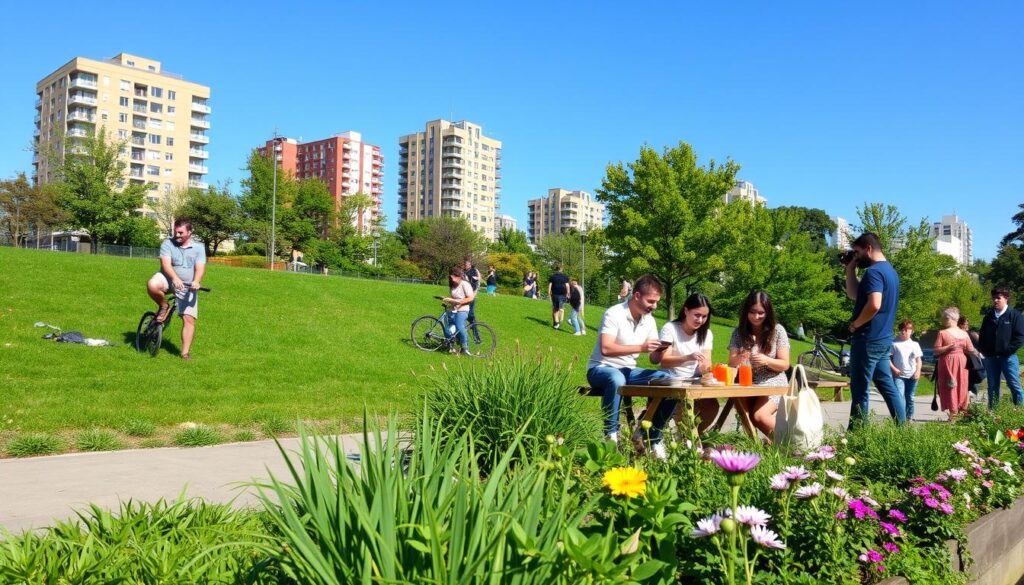
לדעת יותר על הנושא עשוי לדחוף אותנו לפעול. להבין כיצד הבחירות שלנו משפיעות על הכדור הארץ היא מרכזית. כאשר אנו בוחרים אפשרויות ירוקות, כמו תחבורה ציבורית, אנו מפחיתים נזק לכדור הארץ ומעודדים אחרים.
לדבר על שינויי אקלים עוזר להדגיש את הצורך בפעולה קהילתית. אירועים ופורומים בשכונות מספקים מרחב לחלוקת רעיונות. למצוא בכל אלה בעלי תומך יכול להחזיק את המאבק שלנו למדיניות ידידותית לסביבה.
- כבו את האורות כאשר הם לא נדרשים כדי לחסוך באנרגיה.
- עזרו באירועי ניקיון מקומיים כדי לשפר את הסביבה שלנו.
- תמכו בעסקים שדואגים לסביבה.
הפעולות הללו, אף על פי שהן קטנות, מחזיקות כוח גדול. הן מראות שאנו אחראיים ושאנו חלק מתנועה גדולה יותר. על ידי עשיית חלקנו ועבודה עם אחרים, אנו יכולים ליצור שינוי שיישאר.
תפקיד הפעילות האנושית בשינויי אקלים
פעילויות האדם משפיעות בצורה משמעותית על שינויי אקלים. זה קורה בעיקר דרך שימוש בדלקים גופרים ושינויים בנופים. לדעת על אלה הפעולות עוזר להבין את ההשפעה שלהן על אתגרי כדור הארץ.
דלקים גופרים והנפקת פחמן
שריפת דלקים גופרים לאנרגיה ולתחבורה מובילה ל
נפילת פחמן. מנהלת מידע על אנרגיה בארה"ב מציינת, תעשיות משדרות חלק גדול מזה. רכבים ומשאיות המשתמשים בדלק ודיזל מוסיפים גם הם המון פחמן לאוויר שלנו. שימוש זה בדלקי גופית לא רק מוביל לשינויי אקלים אלא גם מחמיא לכך על ידי הפקת חום גבוהה יותר לכדור הארץ.
גירוש יערות ושימוש באדמה
גירוש יערות ושינויים בשימוש באדמה מחמירים את משבר האקלים. הארגון למזון ולחקלאות אומר שאובדן יערות מעלה נפילת פחמן מאחר שעצים סופגים פחמן. יותר חקלאות משמע גירוש יערות נוסף. זה פוגע ביכולת של כדור הארץ להילחם בשינויי אקלים, ומעלה דיונים על אובדן צמחים וחיות ועוד נזק סביבתי.
פעולות אישיות להלחם בשינויי אקלים
כולם יכולים להילחם בשינויי אקלים עם בחירות יומיומיות. על ידי ביצוע שינויים קטנים ניתן להפחית באופן משמעותי את צמיחת הפחמן שלך. ניתן לחיות בצורה בר-תועלתית על ידי בחירת פעולות שמסייעות לכדור הארץ ומצמצמות אנרגיה בבית.
הפחתת צמיחת הפחמן שלך
הורדת הפלטת הפחמן שלך לא צריך להיות קשה. הנה כמה טיפים קלים:
- השתמש בתחבורה ציבורית, עשה קראפול או רכבת על אופניים כדי לחתוך בפליטות.
- אכול פחות בשר ומוצרי חלב כדי להפחית בגזי חממה מחוות.
- חסוך באנרגיה על ידי כיבוי האורות וניתוק מכשירים כשהם לא נדרשים.
אימוץ שיטות ביתיות לקיימות
אתה יכול לעשות המון עבור כדור הארץ מהבית שלך. נסה את הרגלים חברתיות לסביבה האלו:
- מחזור דברים כמו פלסטיק, נייר וזכוכית כדי לעזור להפחית בפסולת.
- בחר במכשירים שמשתמשים בפחות חשמל כדי לחסוך באנרגיה.
- חסוך במים על ידי תיקון נזילות ושימוש במוצרי צינורות יעילים במים.
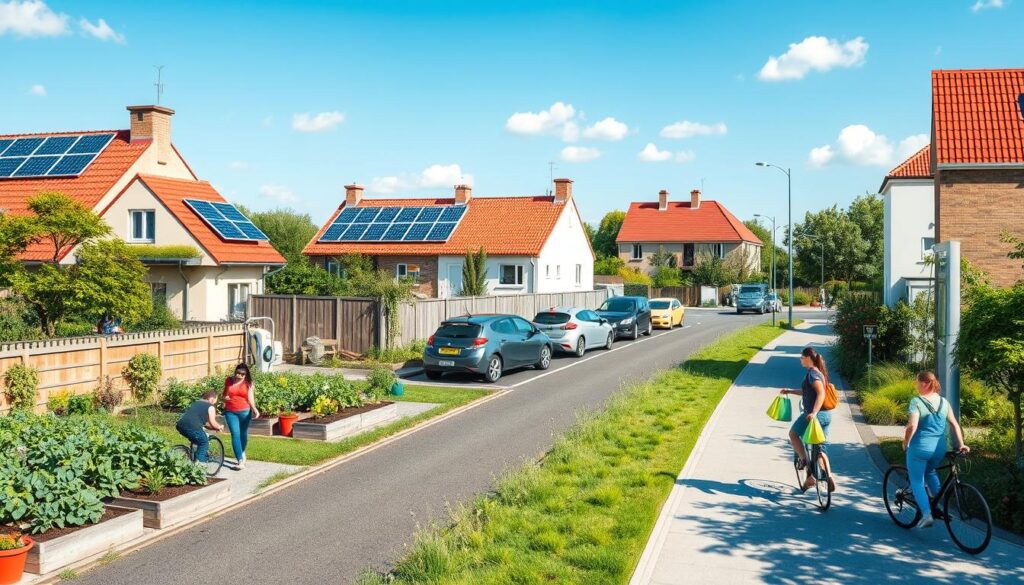
| סוג תרגול | השפעה | דוגמאות לפעולות |
|---|---|---|
| חיסכון באנרגיה | הורדת חשבונות אנרגיה | כיבוי אלקטרוניקה לא בשימוש, שימוש בנורות LED |
| בחירות תחבורה | הפחתת פליטות | שיתוף רכב, הליכה או רכיבה על אופניים |
| חיסכון במים | שימוש פחות במים | מקלחות קצרות יותר, תיקון נזילות |
| ניהול פסולת | פחות פסולת שנשלחת למחמדים | מיצוק פסולת אורגנית, גימור |
השלבים הללו מציגים כיצד לחיות בצורה יותר קיימת, עוזרים להביס את שינויי האקלים. על ידי אימוץ שיטות אלו, אתה לא רק חוסך בעלויות הבית אלא גם מצטרף למאמץ גלובלי להגנה על הסביבה.
יוזמות קהילתיות לפתרונות לשינויי אקלים
העבודה המשותפת בקהילות היא מרכזית להלחם בשינויי אקלים. קבוצות שדואגות לסביבה מובילות את הדרך. הן מריצות קמפיינים שמודיעים לאנשים ומעוררים אותם לפעול. כולם יכולים להצטרף, מניקוי מקומות עד למידה בסדנאות. זה עוזר לבנות עתיד טוב יותר.
קבוצות סביבתיות מקומיות וקמפיינים
הרבה קבוצות מקומיות דוחפות לחיות בסביבה ירוקה בשכונות שלנו. הן מארגנות אירועים כמו יום האדמה כדי להתמודד עם בעיות אקלים. הצטרפות לאירועים אלו עוזרת לנו לעשות שינוי ולפגוש אנשים אחרים שגם להם דואג.
גני קהילה ומרחבים ירוקים
גני קהילה עוזרים לערינו להיות יותר ידידותית לסביבה. הם מציעים מזון טרי ומלמדים אותנו כיצד לטפח את כדור הארץ שלנו. גנים אלו יכולים לספוג יותר פחמן ולחזק את הקהילות.
| שם הפרויקט | מיקום | השפעה על ספיגת פחמן (טונות/שנה) | יתרונות לקהילה |
|---|---|---|---|
| ייזום אצבע ירוקה | פארק העיר | 10 | שיפור בביטחון המזון, חיבור בין הקהילה |
| נווה עירוני | אזור המרכז | 12 | שיפור בביודיברסיטה המקומית, תוכניות חינוכיות |
| קצירת שכונה | מחוז הכפרי | 8 | גישה למוצרים טריים, שיפור באיכות האוויר |
מדיניות ממשלתית ושינויי אקלים
האבקת שינויי אקלים דורשת מדיניות ממשלתית חזקה וחקיקה לגבי אקלים. כל מדינה משמשת תפקיד חיוני. הן עוצבות מדיניות שמשפיעה על המדינה שלהן ועל העולם.
חקיקה שמשפיעה על פעולה לגבי אקלים
בשנים האחרונות, ממשלות הציעו חוקים מרכזיים להתמודדות עם שינויי אקלים. ההסכם הירוק החדש ותוכנית הכוח הנקי הם שני דוגמאות. הם יועצים להפחתת הנפילות הפחמן ותומכים בשיטות ירוקות.
חוקים כאלה חיוניים לפעולת הממשלה בנושא האקלים. הם יוצרים כללים שמקדמים אנרגיה מתחדשת. זה מפחית את ההתלות בדלקים גורמי חממה.
הסכמים וחוזים בינלאומיים
ההסכם פריז הוא הסכם גלובלי חשוב לנושא האקלים. הוא קובע מטרות מאוחרות להפחתת הנפילות של גזי חממה. מדינות מסכימות לעבוד לקראת מטרות אלו, להיאבק בשינויי אקלים ביחד.
ההסכם הזה מתמקד בשקיפות ואחריות. הוא מבטיח שמדינות יעשו את חלקן. האונפק צופה על מאמצים אלו, דוחף לשיתוף פעולה גלובלי כדי להציל את הכדור הארץ.
אנרגיה מתחדשת ושיפורי טכנולוגיה
כשאנו עומדים מול שינויי אקלים, המעבר לאנרגיה מתחדשת הוא מרכזי. מקורות כמו שמש, רוח, והידרו מציעים כוח נקי וקיימות. הסוכנות הבינלאומית לאנרגיה מדגישה עלייה בשימוש באנרגיה מתחדשת, חיונית להתמודדות עם בעיות האקלים.
חשיבותן של מקורות אנרגיה מתחדשת
אנרגיה מתחדשת אינה רק קיימת; היא מעלה את הכלכלה ומקדמת יצירת עבודה. המעבר מנפט וגז לאנרגיה נקיה משמעותו יותר עצמאות ועלויות נמוכות. השינוי הזה גם טוב לבריאותנו על ידי חיתוך זיהום האוויר.
חדשנות בטכנולוגיות ידידותיות לסביבה
טכנולוגיה חדשנית משפרת את אנרגיה המתחדשת והופכת אותה ליעילה יותר. מדרכים חדשים ללכידת פחמן עד רכבות חשמליות, אנו חותכים פליטות. גידול חקלאי קיים גם משתתף בהפחתת צמיחת הפחמן שלנו. ביחד, הטכנולוגיות הללו מקנות לעתיד שלנו ירוק יותר.
| מקור אנרגיה מתחדשת | יתרונות | מצב נוכחי (IEA 2023) |
|---|---|---|
| כוח שמש | עלות-יעיל, מפחית גזי חממה | הקיבוץ המותקן מגיע ל-1,000+ ג'יגה-וואט |
| אנרגיה רוח | עלויות תפעול נמוכות, ניתן להתגמש | הקיבוץ המותקן מגיע ל-900+ ג'יגה-וואט |
| הידרואלקטרי | אמין, גמיש ויעיל | הקיבוץ המותקן מגיע ל-1,300+ ג'יגה-וואט |
מסקנה
מאמר זה מראה שאנחנו צריכים את כולם כדי להילחם בשינויי אקלים. זה בעיה גדולה שמשפיעה על חיינו בכמה דרכים. זה משפיע על בריאותנו, על כספינו, ועל העולם שירשו ילדינו. עלינו לראות כיצד כל אדם וקהילה יכולים לעשות הבדל אמיתי.
אנו צריכים להמשיך ללמוד על נושאים קשורים לאקלים ולדחוף למדיניות טובה. אם נחיה בצורה ירוקה יותר ונצטרף לפרוייקטים אקולוגיים מקומיים, נוכל לעזור. כל פעולה קטנה מוסיפה לשינויים גדולים לעתיד טוב יותר.
סופסוף, זה תלוי בנו להפוך את האדמה לבריאה יותר. שימוש באנרגיה נקייה, חיתוך בפליטות, ותמיכה בפעולות למען האקלים הם מרכזיים. אם נעבוד ביחד, נוכל לבנות עולם בר-תועלת. מקום שבו נזקי שינויי האקלים פחותים וילדינו יכולים לצמוח.


